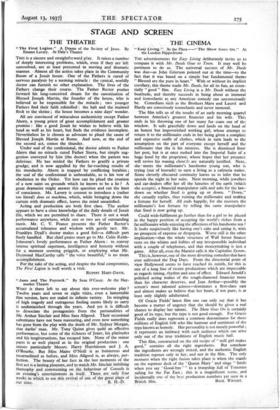THE CINEMA
"Easy Living." At the Plaza--" The Show Goes On." At the London Hippodrome
THE advertisements for Easy Living deliberately invite us to compare it with Mr. Deeds Goes to Town. It may well be pertinent to do so. The universal success of Mr. Deeds was due—as John Grierson pointed out at the time—to the fact that it was based on a simple but fundamental theme " Blessed are the pure in heart." With or without its implicit corollary, this theme made Mr. Deeds, for all its fun, an essen- tially " good " film. Easy Living is a Mr. Deeds without the beatitude, and thereby succeeds in being about as immoral and iconoclastic as any American comedy can unconsciously be. Comedians such as the Brothers Marx and Laurel and Hardy are consciously iconoclastic and never immoral.
The film tells us of the results of an early morning quarrel between America's greatest financier and his wife. This ends in his throwing one of her many fur coats out of the window. It sails gracefully down and lands on the head of an honest but impoverished working girl, whose attempt to return it to the millionaire ends in her being given a complete and expensive outfit of clothes, which in turn leads to the assumption on the part of everyone except herself and the millionaire that she is his mistress. She is dismissed from her post, but is at once rushed into the Imperial Suite Of a huge hotel by the proprietor, whose hopes that her presence will revive his waning clientZL are naturally justified. Next, she -meets the millionaire's handsome young son, who is trying (out of bravado) to earn a living as a cafeteria waiter. Some cleverly obscured continuity leaves us to infer that he spends the night in her suite. Next morning, while jewellers and car-dealers offer her all the luxuries of the earth (which she accepts), a financial manipulator calls and asks for the low- down on whether Steel is going up or down. " Down," she casually replies, thus ruining the millionaire and making a fortune for herself. All ends happily, for she recovers the millionaire's lost fortune by telling the same manipulator that Steel is now going up.
Could wish-fulfilment go further than for a girl to be placed in the happy position of accepting the world's riches from a fat millionaire while enjoying the affections of his handsome son ? It looks suspiciously like having one's cake and eating it, with no prospects of expense or dyspepsia. Worse still is the other implication—that the whole structure of Wall Street finance rests on the whims and foibles of any irresponsible individual with a couple of telephones, and that moneymaking is just a game. After all, even the Marxist calls it the Capitalist System.
This is, however, one of the most diverting comedies that have ever enlivened the Dog Days. From the directorial point of view Hollywood seems to have reached its zenith, for this is one of a long line of recent productions which are impeccable as regards timing, rhythm and ease of effect. Edward Arnold's polished acting makes of the rough-diamond financier more than his character deserves, and Jean Arthur—possibly the screen's most talented actress—dominates a first-class cast and almost makes us believe that her heart, if not pure, is at least only slightly adulterated.
Of Gracie Fields' latest film one can only say that it has become a matter of urgency that she should be given a real chance to display her talents. The Show Goes On is certainly good of its type, but the type is not good enough. For Gracie Fields really does represent a common denominator for those millions of English folk who like humour and sentiment of the type known as homely. Her personality is not merely powerful ; it represents an intimacy with each audience which can arise only out of the true traditions of English music hall.
This film, constructed on the old recipe of " mill girl makes good," contains all the right ingredients. But somehow the ingredients are wrongly mixed, and the authentic English tradition reposes only in her, and not in the film. The only moment when the right fusion takes place is when she stands on the topmost deck of the ' Queen Mary ' and sings " Smile when you say ' Good-bye ' " to a troopship full of Tommies sailing for the Far East ; this is a magnificent scene, and incidentally one of the best production numbers yet seen in a






































 Previous page
Previous page